EXPLAINER: Why were Japanese abducted by North Korea?
U.S. President Joe Biden has met with families of Japanese citizens abducted by North Korea decades ago to show his support for their efforts to win the return of their loved ones

Your support helps us to tell the story
From reproductive rights to climate change to Big Tech, The Independent is on the ground when the story is developing. Whether it's investigating the financials of Elon Musk's pro-Trump PAC or producing our latest documentary, 'The A Word', which shines a light on the American women fighting for reproductive rights, we know how important it is to parse out the facts from the messaging.
At such a critical moment in US history, we need reporters on the ground. Your donation allows us to keep sending journalists to speak to both sides of the story.
The Independent is trusted by Americans across the entire political spectrum. And unlike many other quality news outlets, we choose not to lock Americans out of our reporting and analysis with paywalls. We believe quality journalism should be available to everyone, paid for by those who can afford it.
Your support makes all the difference.U.S. President Joe Biden met Monday with families of Japanese citizens abducted by North Korea decades ago to show his support for their efforts to win the return of their loved ones.
The families said Biden talked to each of them and listened to their stories, encouraging them as their hopes were fading because of North Korea's escalating missile sand nuclear development.
WHO ARE THE JAPANESE ABDUCTED BY NORTH KOREA?
Japan says North Korea abducted at least 17 Japanese citizens, possibly many more, during the 1970s and 1980s. Twelve remain missing.
They include school children and others living along Japan's coast. Many were bundled into small boats and taken across the sea to North Korea.
WHY WERE THEY ABUDUCTED?
North Korea apparently wanted them to train spies in Japanese language and culture, or to steal their identities so agents could masquerade as Japanese for espionage aimed mainly at South Korea.
After admitting in 2002 that it had abducted 13 Japanese, North Korea apologized and allowed five to return homer. It said eight others had died and denied that the other four entered its territory. It has promised a reinvestigation, but has never announced the results.
Japan says North Korea has refused to send the others home because of concern that they might reveal inconvenient information about the country.
HOW WAS BIDEN'S MEETING WITH THE FAMILIES?
Koichiro Iizuka, 45, whose mother was abducted in 1978 and was raised by his uncle, said he was “grateful that President Biden sincerely listened to each of our stories" and promised his support.
Sakie Yokota, 86, whose 13-year-old daughter, Megumi, was abducted in 1977 from Japan's northern coast on her way home from school, said Biden kneeled down to listen to her and told her that as a parent who has lost two children he understands her pain. “That really cheered me up,” said Yokota, whose husband died two years ago. “I asked the president for his support so that all of us can have our loved ones back."
Her son, Takuya Yokota, who heads the group of abductees' families, said Biden's show of solidarity gave courage to the families and also highlighted North Korea's human rights violations.
WHERE DOES THE ISSUE STAND?
Japan's government has made the issue a political priority and has demanded that North Korea immediately return all the remaining abductees. Japanese Prime Minister Fumio Kishida has said he is willing to meet with North Korean leader Kim Jong Un without preconditions, but there has been no progress.
Many elderly relatives say they’re running out of time to see their loved ones.
Japan and North Korea have no diplomatic ties, and efforts to resolve the issue have largely stalled for nearly a decade due to the North Korea’s nuclear and missile development and Japan's imposition of sanctions in response.